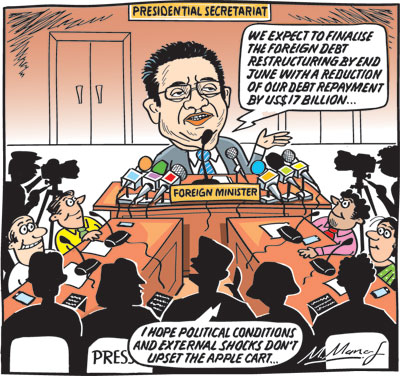Columns
Foreign debt restructuring: Risks and uncertainties in our external finances
View(s): The prospect of foreign debt restructuring by the end of next month is indeed good news. However, there are many uncertainties and risks in our external finances arising from a deterioration in the trade balance, external shocks that could reduce foreign remittances, and both external and internal disruptions that could upset tourism and reduce tourist earnings, as has happened before.
The prospect of foreign debt restructuring by the end of next month is indeed good news. However, there are many uncertainties and risks in our external finances arising from a deterioration in the trade balance, external shocks that could reduce foreign remittances, and both external and internal disruptions that could upset tourism and reduce tourist earnings, as has happened before.
Ali Sabry’s statement
Foreign Minister Ali Sabry’s statement that the foreign debt restructuring will be completed by the end of June and is expected to have a haircut of US$ 17 billion is indeed good news. Nevertheless, there could be disagreements between the creditors that could delay the finalisation of the foreign debt restructuring.
External shocks
In addition, there are external shocks and internal conditions that could adversely affect the country’s external finances. The country’s external finances could face several risks and uncertainties in this election year.
Uncertainty
In spite of the Foreign Minister’s confidence that the external creditors would come to a settlement with a reduction in debt (haircut), the position of China could hamper the finalisation of the foreign debt restructuring.
China
China’s position has been that it would assist Sri Lanka’s debt repayment, but it could not agree to a haircut because a debt reduction for Sri Lanka would set a precedent to make similar reductions in their huge debts to other countries. How this dilemma would be overcome remains to be seen.
External reserves
The external reserves have increased to about US$ 4 billion due to increased remittances and a boom in tourism. Despite a widening trade deficit, the Central Bank expects the reserves to rise to over US$ 5 billion by the end of 2024. This is mostly due to increased remittances and earnings from tourism.
There is an expectation of increased foreign assistance and foreign investments after the foreign debt restructuring. Foreign governments and international agencies like the Asian Development Bank, the World Bank and the International Finance Corporation (IFC), which is an affiliate of the World Bank, are expecting to make investments and begin projects. The Japanese government is expecting to resume several projects that were stalled by the previous regime.
Trade deficit
On the other hand, the trade deficit is expected to widen due to increased imports and reduced exports, especially of manufactured merchandise. Already, the trade deficit has widened and is expected to increase in the next seven months.
Risks
The two strengths of the balance of payments—remittances and tourism earnings—have risks and uncertainties. Remittances could dip with the growing insecurity in Arab countries. It could also result in workers returning to the country.
Remittances
The increase in remittances could dip if security conditions in West Asia deteriorate with the escalation of the Israeli-Palestine war. The indications are that it would. This would affect over one-half of remittances that are from West Asia. Already, the migration of workers to the region has decreased, and many workers may return owing to the expanding conflict in the region.
Tourism
Tourism is currently booming, and earnings from the sector are expected to exceed US$ 4 billion this year. However, tourism could be adversely affected by external and internal shocks. It could be mostly affected by domestic insecurity during the coming months owing to the elections.
If the two elections this year lead to violence, the country could be considered unsafe for tourists. Travel advisories could warn that the country may not be safe for tourists owing to the elections, even if there are no upheavals. Post-election political instability can also affect tourism.
Summary
If the foreign debt restructuring is achieved by the end of next month, with a significant haircut, the external finances of the country will be strengthened by foreign assistance and investment. However, there are many uncertainties and risks in our external finances. These arise from a deterioration in the trade balance, external shocks that could reduce foreign remittances, and both external shocks and internal disruptions that could upset tourism and reduce tourist earnings, as has happened before.
Conclusion
The prospect of an improvement in the external finances owing to the restructuring of the foreign debt and increased remittances and earnings from tourism is subjected to external and internal shocks. This year could be one of improvement in external finances, provided these risks and uncertainties do not occur.
It is of utmost importance that there are no social upheavals during the forthcoming elections.
Buying or selling electronics has never been easier with the help of Hitad.lk! We, at Hitad.lk, hear your needs and endeavour to provide you with the perfect listings of electronics; because we have listings for nearly anything! Search for your favourite electronic items for sale on Hitad.lk today!


Leave a Reply
Post Comment